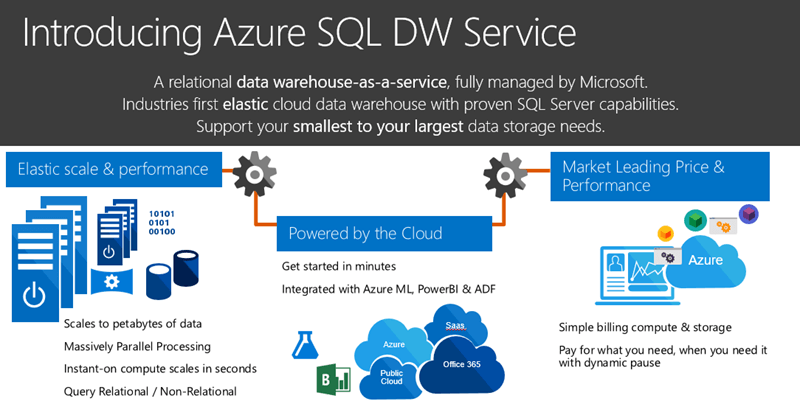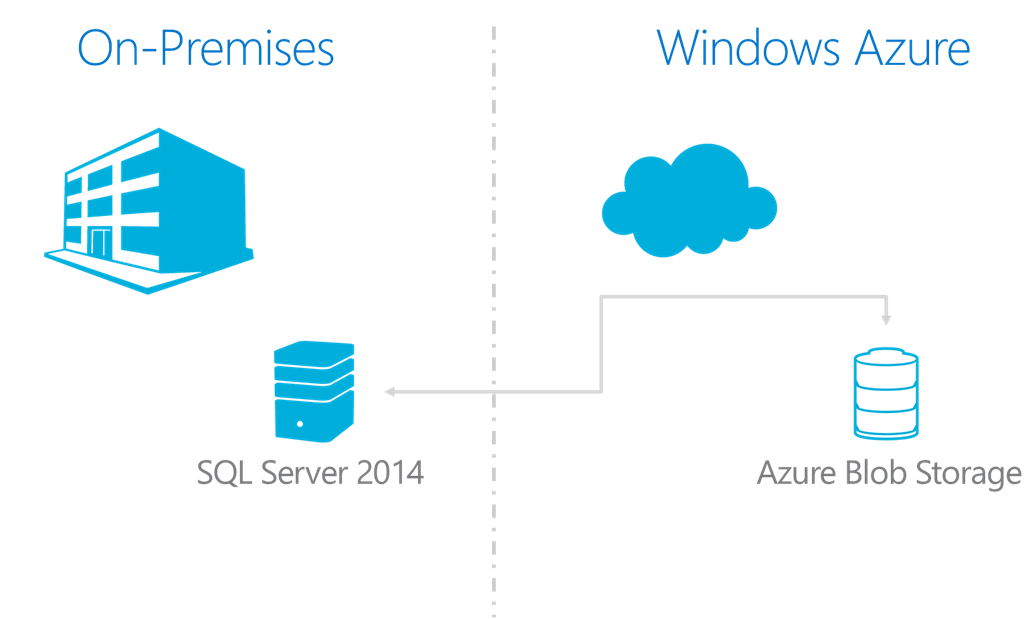Azure SQL Data Warehouse was launched by Microsoft when they decided to make use of the cloud. The company turned its Azure services into enterprise-grade cloud-based solutions that integrate cutting-edge features like data management and analytics at its core.
One of the services that Microsoft is pushing with a lot of energy, is the Azure SQL Data Warehouse. It is a scalable database management service, blended with elastic data warehouse features.
Initially, Microsoft released the Azure SQL Data Warehouse for a short preview in July 2015, subsequently following it up with a public preview in September 2015. They have released several updates on the service since then.
If you want to Enrich your career with a Microsoft Azure certified professional, then visit Mindmajix - A Global online training platform: “Azure course” . This course will help you to achieve excellence in this domain.

SQL Data Warehouse
The Azure SQL Data Warehouse is one of Microsoft's latest offerings. It is a scalable, fully-managed cloud service with enterprise-class features. Microsoft SQL Data Warehouse is a distributed database management system compatible with a variety of existing Microsoft products and SQL Server tools, as well as with top Azure features like Data Factory and Machine Learning. It is offered as Platform-as-a-Service(PaaS) and is built on MPP (Massively Parallel Processing) architecture.
The Azure SQL Data Warehouse, as revealed by Microsoft, can support a massive amount of data, which can range in petabytes. This big data can be scaled easily by users, who are looking to manage costs and control operations in an efficient manner.
In addition, Microsoft's cloud-based SQL database management model allows users the convenience of a 'pay-as-you-go' pricing structure, which enables cost-effective options like paying for services only when it is required.
Azure SQL Data Warehouse Deep Analysis
The Azure SQL Data Warehouse serves as a fundamental component in retrieving, processing, storing, and analyzing big sets of data.
This enables the deployment of machine learning and analytics, which leverage business intelligence - a 'must-have' feature in new-generation business environments.
The enterprise-ready database service, based in the cloud, provides global businesses with an end-to-end solution that incorporates a control node, an increased number of compute nodes, and highly-reliable storage, which helps enterprises manage the exponential influx of Big Data dominating today's computing ecosystem.
Top Microsoft Azure Interview Questions
There's a Lot More in Azure SQL Data Warehouse Than Merely SQL Database
The integrated control node of Azure SQL Data Warehouse accomplishes data movement processes and compute operations that are spread across the entire computing network.
Right at the centre of these operations, is Azure SQL Data Warehouse's Massively Parallel Processing (MPP) engine, which splits convoluted queries into coordinates and parallel processes that enable processing across several compute nodes.
The Azure compute nodes, driven by the SQL Database, perform the heavy task, especially when big data is loaded into the warehouse.
When a user makes a data query, the MPP divides the query and distributes it across numerous compute nodes, which instantly start working with its respective chunk, processing the assigned data and adding it to the storage.
After the nodes complete the processing of a query, they deliver the results to Azure SQL's control node that consequently aggregates the processed data.
The Azure SQL's compute nodes and the control node are also dependent on the Microsoft Data Movement Services (DMS) as well, which facilitates seamless data movement and communication between the compute nodes and the control node, making the implementation of aggregations and joins possible across various nodes.
Azure SQL Data Warehouse - Storage Component
Microsoft's Azure SQL Data Warehouse deploys a high-performance, enterprise-grade storage, known as the Azure Blob Storage. The compute nodes read and write directly from this Storage.
Enterprise data is safe and secure with Azure Blob, as the state-of-the-art storage is not impacted by abrupt pausing of computing services, restoring or backing up of data to Azure SQL's warehouse, or the scaling of data warehouse and storage services.

As per Microsoft, the Azure SQL Data Warehouse integrates high-class techniques and algorithms that support the Data Movement Services in transferring data securely and efficiently.
In addition, the top-of-the-line database service also utilizes a high-level query optimizer and complex statistics, which combinedly generate query programs and optimize the distribution of data.
Azure SQL Data Warehouse - Features
1. Ease of Scalability: The best feature of the Azure SQL Data Warehouse is its elastic nature. It enables scalability with possibilities to manage the compute and storage resources separately. This creates a win-win platform, where users pay for only what they need and when they need it.
The computing side of Azure SQL Data Warehouse is founded on the principle of Data Warehouse Unit (DWU), which keeps track of computational resources like storage I/O, memory, and CPUs used across participating compute nodes.
2. Flexibility: Another key advantage of Microsoft Azure SQL Data Warehouse is its 'pause' feature, which allows users to pause the computing services when they don't require it.
The leading cloud database service also provides users with the flexibility to cancel any running queries, or any assigned DWUs to the data warehouse, which enables the curtailment of unnecessary fees when services are not being used. User data, however, remains safe and secure with Azure Blob Storage.
3. Seamless Compatibility: Azure SQL Data Warehouse seamlessly integrates with Azure Platform Services and other analytics solutions. It is compatible with Power BI, Azure Machine Learning, HDInsight, Azure Data Factory, and also with other third party products. It easily integrates with development tools making it useful for creating end-to-end analytics solutions.
Related Article: Snowflake vs Redshift
4. Security: Azure SQL Data Warehouse has a connection security feature. It allows you to restrict access using firewall rules to restrict to certain IP or IP range. Integrating with Azure Active Directory (AAD) authentication allows connecting to Azure SQL Data Warehouse using identities in Azure AD. The multi-layer protection offers encryption at rest, in motion, or in use to ensure your data is not misused. Additional built-in tools help in auditing and monitoring data for maintaining regulatory compliance and identifying suspected security violations.
Microsoft's Azure SQL Data Warehouse, when combined with other Microsoft tools and services, offers an unprecedented performance which becomes a key differentiator when comparing it with other similar services in the market.
Azure SQL Data Warehouse Best Practices
To design and maintain an Azure SQL Data Warehouse you must use the following best practices:
- Use descriptive dimension attributes as they are easier to understand.
- Store measures that can be fully aggregated in the SQL data warehouse.
- Using the smallest data types possible as it helps optimize data storage and semantic model processing.
- Using a star schema design as it is easy to understand and facilitates better performing queries.
- These Azure SQL Data Warehouse best practices help in obtaining optimal throughput and query performance.
Azure Data Warehouse vs Azure Data Lake
Azure Data Warehouse and Azure Data Lake are both used for storing big data but they serve different purposes. Depending upon the organization’s storage requirement one might be more beneficial than the other but they cannot be used interchangeably.
The main differences are:
Azure SQL Data Warehouse Limitations
Azure SQL Data Warehouse is a powerful data warehouse service but it has the following limitations:
- Microsoft Azure SQL Data Warehouse session fails have been encountered upon running existing sessions after upgrading to PowerExchange.
- PowerExchange for Microsoft Azure SQL Data Warehouse does not support the datetimeoffset data type.
- It doesn’t offer any support for data masking and Entity Framework.
- It is only accessible by the hostname via the Internet and there are no endpoints for virtual networks.
Conclusion
Azure SQL Data Warehouse, is the ideal solution for enterprises that require a distributed processing system that integrates with their existing resources. Unlike the on-premises equivalent (APS), Azure SQL DW is easily and quickly scalable and highly accessible for a workload using the familiar T-SQL language.
If you are interested to learn Azure and build a career in Cloud Computing? Then check out our Microsoft Azure Certification Training Course at your near Cities
Microsoft Azure Course Bangalore, Microsoft Azure Course Hyderabad, Microsoft Azure Course Pune, Microsoft Azure Course Delhi, Microsoft Azure Course Chennai, Microsoft Azure Course Newyork, Microsoft Azure Course Washington, Microsoft Azure Course Dallas, Microsoft Azure Course Maryland
These courses are incorporated with Live instructor-led training, Industry Use cases, and hands-on live projects. This training program will make you an expert in Microsoft Azure and help you to achieve your dream job.
 On-Job Support Service
On-Job Support Service
Online Work Support for your on-job roles.

Our work-support plans provide precise options as per your project tasks. Whether you are a newbie or an experienced professional seeking assistance in completing project tasks, we are here with the following plans to meet your custom needs:
- Pay Per Hour
- Pay Per Week
- Monthly
| Name | Dates | |
|---|---|---|
| Azure Training | Apr 19 to May 04 | View Details |
| Azure Training | Apr 22 to May 07 | View Details |
| Azure Training | Apr 26 to May 11 | View Details |
| Azure Training | Apr 29 to May 14 | View Details |

Anji Velagana is working as a Digital Marketing Analyst and Content Contributor for Mindmajix. He writes about various platforms like Servicenow, Business analysis, Performance testing, Mulesoft, Oracle Exadata, Azure, and few other courses. Contact him via anjivelagana@gmail.com and LinkedIn.
- Azure Active Directory
- Azure Active Directory B2C
- Azure Active Directory Domain Services
- Azure Analysis Services
- Azure App Services
- What is Azure Application Insights?
- Azure Arc
- Azure Automation - Benefits and Special Features
- A Complete Guide On Microsoft Azure Batch
- Azure Cognitive Services
- Azure Data Catalog
- Azure Data Factory - Data Processing Services
- Microsoft Azure Data Factory Tutorial (2024)
- Everything You Need To Know About Azure Data Lake
- Azure DNS - Azure Domain Name System
- Azure ExpressRoute
- Azure Functions - Serverless Compute
- Azure Interview Questions and Answers (2024)
- Azure IoT Edge Overview
- Azure IoT Hub
- What Is Azure Key Vault??
- Azure Load Balancer
- Azure Logic Apps - The Lego Bricks to Serverless Architecture
- Azure Machine Learning
- Microsoft Azure Media Services
- Azure Monitor
- Introduction To Azure SaaS
- Azure Security Center
- Azure Service Bus
- Overview of Azure Service Fabric
- Azure Site Recovery
- Azure Stack - Cloud Services
- Azure Stream Analytics
- Azure Virtual Machine
- Azure’s Public Cloud
- Microsoft Azure Application Gateway
- Microsoft Azure Certification Path
- Microsoft Azure - Exactly What You Are Looking For!
- Microsoft Azure Fabric Interview Questions
- HDInsight Of Azure
- IS Microsoft Azure Help To Grow?
- Microsoft Azure Portal
- Microsoft Azure Traffic Manager
- Microsoft Azure Tutorial
- Overview of Azure Logic Apps
- Top 10 Reasons Why You Should Learn Azure And Get Certified
- Server-Less Architecture In Azure
- What is Microsoft Azure
- Why Azure Machine Learning?
- Azure DevOps Interview Questions
- Azure Active Directory Interview Questions
- Azure DevOps vs Jira
- What is Azure Service Fabric
- What is Azure Databricks?
- Azure Databricks Interview Questions
- Azure Data Factory Interview Questions
- Azure Architect Interview Questions
- Azure Administrator Interview Questions
- Azure Data Studio vs SSMS
- Microsoft Interview Questions
- What is Azure Data Studio - How to Install Azure Data Studio?
- Azure DevOps Projects and Use Cases
- Azure Data Factory (ADF) Integration Runtime
- Azure DevOps Delivery Plans
- Azure DevOps Variables
- Azure DevOps vs GitHub
- Azure DevOps Pipeline















